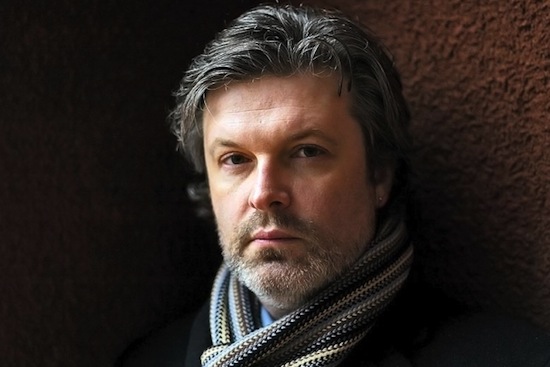A stormy yet brilliant birth for MacMillan premiere at Grant Park
“You are troupers,” said Carlos Kalmar to the rain-drenched audience at the Grant Park Music Festival Friday night.
In what is becoming the meteorological leitmotif of this summer’s lakefront festival, Friday night’s concert was accompanied by cool temperatures and consistent heavy rain, which made for an empty lawn and sparsely populated Pritzker Pavilion. The hardy aficionados that remained huddled under umbrellas or sat in the front rows sheltered by Frank Gehry’s steel billows. The towering glass stage doors were even closed a third of the way on either side during the concert’s first half to shelter musicians from the wind-blown wetness.
The main event of the spiritually focused program, presented by Kalmar and the Grant Park Orchestra, was James MacMillan’s Quickening, written in 1998 but heard Friday in its Midwest premiere.
The gifted Scottish composer, whose knighthood was announced earlier this month, has received fine advocacy in the past from Kalmar and the festival musicians. Even with the uncooperative weather, Kalmar and the Grant Park forces delivered a stirring and brilliant sendoff for MacMillan’s expansive opus.
A four-part choral symphony in all but name, Quickening is, as Kalmar stated, “a meditation on the origin of life” from both a religious and philosophical perspective. MacMillan’s Roman Catholic faith is the inspiration for nearly all of his music and Quickening is no exception.
Written to poetic texts by Michael Symmons Roberts, Quickening (the title, says the composer, refers to the moment of conception) is cast on a large scale, spanning 48 minutes and scored for vast forces, including large orchestra with expanded percussion brigade, organ, large mixed chorus, children’s chorus and male quartet.
The four movements chart “birth, new life, new impulses,” moving from conception through delivery, the darkness of premature births, the infant’s emergence into a violent world, and ultimately a quiet hopefulness.
The first section, “Incarnadine,” opens in hushed mystery with shimmering chimes, marimba and high percussion, against astringent violin lines. The chorus chants a wordless Babel-like glossalalia (“phony Aramaic,” as Kalmar put it) that grows in volume and complexity, recalling the microtonal voicings of Ligeti’s Requiem. The full chorus emphatically declaims Roberts’ text in imposing fashion. A male vocal quartet sings words of the infant, their music painting an old-new madrigal-like effect, set against vaulting, stratospheric lines for the chorus’s sopranos.
“Midwife” opens with ominous percussion and low brass and here three low members of the male quartet sing of the midwife’s duties and responsibility, which at times gets a bit precious and is the least convincing part of the work.
The full power of the orchestra is unleashed in the third movement, “Poppies,” which reflects the violent world into which the child is born, painted with hammering metal percussion and turbulent string figurations. The male quartet sings Roberts’ stanzas about the plight of lost premature babies (“Born too soon, my loose skin was rice-paper”).
The final section “Living Water” begins in luminous mystery with the sound of three humming temple bowls, and a reprise of the chorus’s wordless murmuring. The music builds again to an even more massive climax, eventually descending with an elegiac violin solo (well played by concertmaster Jeremy Black), and ending on a note of peaceful solace.
Quickening is a big, complex and multifaceted work with a lot to take in at first hearing. MacMillan’s distinctive brand of musical “muscular Christianity” is here at his most flamboyant and audacious, with largely successful results. The composer wields his vast forces with skill and panache, particularly in his writing for brass and his favored percussion, often making a dazzling and brilliant effect.
Kalmar and the vast forces delivered supreme advocacy in a tour de force performance. The Grant Park Orchestra played with superb intensity and commitment, not least the hard-working brass and percussion.
Christopher Bell’s Grant Park Chorus is having one of their best summers, and offered polished singing with words crystal-clear across all sections. The sopranos handled MacMillan’s punishingly high passages with wondrous ease and bravura. The young singers of Anima also contributed nicely with their atmospheric offstage contributions.
A note of gratitude must be given to Bell for saving these performances. When U.S. visa government computers crashed recently, the four originally scheduled British soloists were unable to get to Chicago. Bell quickly assembled a quartet of three Grant Park Chorus members (tenors Hoss Brock and Klaus Georg and bass David Govertsen) and one former member (countertenor Ryan Belongie). The four men learned their parts in less than a week and deserve special kudos for saving the day and performing so well to boot. With better weather Saturday, Quickening should play to the large audience it deserves.
The first half of the evening formed a spiritual nexus with the MacMillan premiere with works by Wagner and Mendelssohn similarly imbued with religious inspiration.
Though hailing from a prominent Jewish family, Mendelssohn’s parents were Christian converts and the composer himself a devout Lutheran. His “Reformation” symphony (No. 5) has no direct program though the ecclesiastical element is palpable in Mendelssohn’s use of the rising “Dresden Amen” theme as well as mining the famous Protestant chorale, “Ein feste Burg”
Kalmar led a spirited, idiomatic performance, which neatly balanced the solemn ceremony with the composer’s bracing vivacity. Mendelssohn’s breezy contrapuntal writing was especially well served and the climactic reappearance of the Lutheran hymn received all due sonorous weight in the final section.
The evening began with the Prelude to Act 1 of Wagner’s Parsifal. As with the Mendelssohn symphony, the music is built upon the same rising Dresden theme. As Kalmar stated in his introduction, the Prelude is among the most sublime music ever put to paper, and the conductor led a spacious, reverent performance, with resplendent string tone, the religious element manifest in the coda’s radiant benediction.
The program will be repeated 7:30 p.m. Saturday at the Pritzker Pavilion. gpmf.org
Posted in Performances


